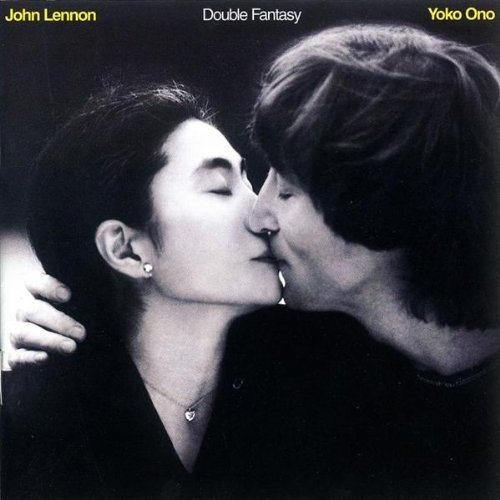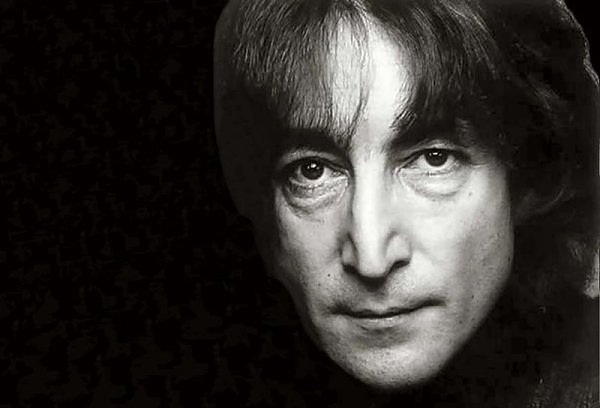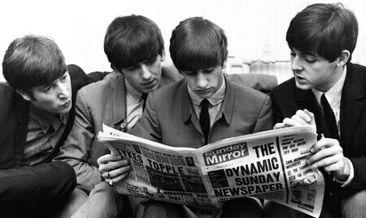—————————————

John Lennon: Essence and Reality
Part 12: “Cleanup Time”.
“Once I accepted the reality of the situation, something greater
than me took over and all of a sudden I lost my fear.” Thus spake
Lennon in 1980. In this blog, we’ll look at why Lennon said this, and
its context, both personal and musical. They’re good words to start
with, because they suggest the largeness of Lennon’s endeavour when he
was working on Double Fantasy, from which album comes “Cleanup Time”.
Melodically, “Cleanup Time” is by no means Lennon’s strongest song,
but it’s one of his most lovable, and it’s deceptively deep, at least
in my view. I recall that at one time I was taking singing lessons from
a pleasant, well-fed nun. She was treating me, musically that is, to a
diet of her favourites, which were mostly Broadway standards. One day
she very kindly asked me to think about what I might like to learn, and
so the next week I brought along the sheet music for “Cleanup Time”.
She had never heard it before: neither had her pianist. But as she came
to know the song, Sister started to tap her fingers, and then her feet,
and soon she started to do a little jig. “This is a joy”, she said. And
that sounds right.
I think of “Cleanup Time” as being one of the “Yoko Ono songs”. It
not only paints a humorous thumb-nail portrait of her, but it’s
inspired by her approach to life: hard-headed and romantic by turns,
with positive affirmation, and lots of talk of magic. This is part of
Yoko’s worldview, that to speak and think and to imagine positively is
to make a positive future. She sees the connection between imagination
(what I might call “creative visualisation”) and reality. This willing
of the positive into reality is what she calls magic, which is why in
“You’re the One” from Milk and Honey she describes John and herself as
“a wizard and a witch”. This belief that we are making our present and
future right now, and can make them better right now is an example of
“instant karma”.
Now to apply this to “Cleanup Time”. At the outset of the song, as a
guitar picks at a loose line, Lennon seems to mutter an incantation. It
sounds to me like: “Bubble, bubble … toil”, a reference to the famous
spell from Shakespeare’s Macbeth, with its refrain “Double, double,
toil and trouble. Fire burn, and cauldron bubble.” As Lennon’s mumbling
fades out, the band comes together and sweeps us into a burbling brook
of sound, while Lennon begins, half speaking rather than singing:
Moonlight on the water, sunlight on your face,
You and me together, we are in our place.
The gods are in the heavens, the angels treat us well,
Oracle has spoken, we cast the perfect spell.
The queen is in her counting house, counting out the money,
The king is in the kitchen, making bread and honey.
No friends and yet no enemies, absolutely free.
No rats aboard the magic ship of perfect harmony.
And then with a surge of energy, and even a bit of growl on the words “now” and “let”, he sings:
Now it begins, let it begin: Cleanup time!
Cleanup time! Well! Well! Well!
However far we travel, Wherever we may roam,
The centre of our circle will always be our home.
Cleanup time! Cleanup time!
The third verse is shorter, as, instead of the last couplet, a
saxophone plays a solo. It is worth listening to it through headphones:
the musicians clearly had a lot of fun, and the guitars, in particular,
emit almost random screeches in the background, but the randomness of
the sound has an effect that is complementary to the song. The piece is
only just under three minutes long, it doesn’t overstay its welcome,
and as it is, it is totally satisfying.
As I’ve mentioned in a previous blog, it is odd that Sean isn’t
mentioned. I don’t feel that he’s excluded, and he does have a song all
to himself, so to speak, later on the album, in “Beautiful Boy (Darling
Boy)”. But still, the omission is odd: I can’t imagine that Lennon left
Sean out because he felt that Julian might be hurt.
The real issue is, when Lennon speaks about, cleaning up, what is
being cleaned? I think the answer is a large one: it is their lives. I
think he means their drug taking, their approach to each other and to
others, the food they were eating, and even financially, that they were
getting their act together. So the references to the king and queen
were humorous but it was the humour of a happy truth. Then, by
implication, he was perhaps admitting that in the past he may have
forgotten that his home was central, but now he would not. The way he
sings “Now” when he sings “Now it begins” demonstrates that he felt he
had come to a significant and fresh point. About this time he was
writing a song with the words “life begins at 40″, because that was how
he felt. Further, the opening references to moonlight and sunlight
remind me of his insight in “Oh! My Love” into the transformative power
of the simplest and clearest impressions (see the first Lennon blog).
He is to remain centred in reality, and reality, as we saw with “God”,
he identified with “Yoko and me”. This is why he sang: “You and me
together, we are in our place.”
Doggett sees a little dig at Yoko and her tarot readers and psychics
in Lennon’s reference to an oracle and a spell, (The Art and Music of
John Lennon, 297): I must say, I don’t interpret those lyrics that way.
Given Lennon’s habit of travelling all over the world in compliance
with the advice these people gave Yoko, the lyrics are more likely to
be celebratory (he flew to South Africa and then travelled to Bermuda
in accordance with “psychic” advice: see John Lennon: The Life, Philip
Norman, 789). Over and above that, I don’t sense any irony here.
However, Doggett is correct to see in the reference to the king and
queen, an allusion to “Cry, Baby Cry” from The Beatles double album.
That song had something magical, perhaps redolent of “Alice in
Wonderland”, and that is what I hear here, 12 years later.
It is funny, but while the line about having neither friend nor
enemy and being absolutely free is bracing in its clarity and
cleanness, I don’t believe it expressed the whole truth, and I never
did, even before the assassination. Yet, I feel that this is one aspect
of the truth, and was Lennon’s genuine experience: he felt that he and
Yoko made a self-sufficient pair. It smacks to me of his words from “In
My Life” about how his dear memories lose their meaning when he thinks
of love as “something new”. It isn’t cold: there is something impartial
about it, but still incomplete. The words “magic ship of perfect
harmony” may even have been inspired by an event which occurred not
long before the writing of this song.
In 1980, Lennon made an important sailing trip to Bermuda. I will
not attempt to retell the account told by Chris Hunt (”Just Like
Starting Over: The Recording of Double Fantasy”, first published in
Uncut Legends, December 2005, by Chris Hunt, retrieved from
http://www.chrishunt.biz/features26.html @ 16 May 2009), but it is well
worth reading. If, as it seems, the story is true, then when Lennon
sailed to Bermuda, he alone of the crew, was well enough to assist the
captain get through a six day storm (the story is accepted by Philip
Norman). The captain quoted Lennon as saying the following about his
feelings when he (i.e. the captain) was obliged to leave Lennon alone
to steer the boat:
Once I accepted the reality of the situation, something greater than
me took over and all of a sudden I lost my fear. I actually began to
enjoy the experience, and I began to sing and shout old sea shanties in
the face of the storm, feeling total exhilaration. I had the time of my
life. … I was so centred after the experience at sea that I was tuned
in to the cosmos – and all these songs came!
Little wonder that the captain went on to say that when he returned
to the deck several hours later, Lennon was “just enraptured”.
Interestingly, Lennon was also supposed to have said that the reason he
seemed immune to sea-sickness, when three experienced sailors were laid
up with it, was that as a former heroin addict who had made it through
withdrawal, he had learned to control his urge to vomit.
And I think this is the clue to the deep if subdued joy of “Cleanup
Time”. Lennon had been through some difficult times, some hard times,
and some dirty times. But he had come through. When I first heard
Double Fantasy, I formed the view that Lennon had started writing songs
more radically original than any in the history of modern pop: he had
started writing the songs of the householder. This is Gurdjieff’s way
of referring to the person who is on a road of spiritual development
simply by their manner of living ordinary life.
The concept of the householder is quite important: Gurdjieff said
that the spiritual way could not begin at a lower level than that of
ordinary and competent life (Miraculous 154). This means that unless
you can organize your life: your food, clothing and shelter, in a
competent manner, and care for your children if you have any, your
chance of organizing anything at a higher level is nil. Of course, this
is a principle: there are also issues of accident and even fate to take
into account, so that someone, anyone, of whatever level, living in
Afghanistan, may find circumstances overwhelming. But Gurdjieff’s
valuation of the householder is inimical to the romance of the
“bohemian” (Miraculous 362-4), or as we might say today, the “beatnik”
or “hippie”. Bohemians and hippies, according to Gurdjieff would be
“tramps” (people with no values). Equally remote from the spiritual way
are “lunatics”, people with wrong values. Interestingly, Gurdjieff said
that we have elements of all three within ourselves, but there is still
room for one type to predominate.
Lennon did not put it into these words: so far as I know he had not
read or even heard of Gurdjieff and Ouspensky. But if he had not, this
would make his achievement all the greater. It would mean that he had
tried a certain way of life, found it failing, and amended his ways.
This is why I think of some of the songs from those last years as being
“householder songs”. This concept also shows the significance of how
Yoko and he became more and more concerned to eat nourishing food, and
the importance of Lennon’s learning to prepare brown rice and bake good
bread. These are good, simple householder tasks.
There is much in the later Lennon which can be explained from this
perspective, but I’ll close with his statement “something greater than
me took over and all of a sudden I lost my fear.”
There is something greater than us, and it’s manifestation in our
lives is related to our acceptance of the situation, whatever that
situation may be. It is, ultimately, related to accepting that we are
as we are. But that does not mean congratulating ourselves, for as we
are we have a possibility of developing, of becoming better, perhaps
even more godlike. I would say that a good first step is to remember
ourselves more often and more deeply, and perhaps this is what Lennon
experienced when he spoke of being “so centred”. But self-remembering
is only the first step, and few “householders” have ever heard of it or
conceived anything like it. No matter, they progress through their own
way of life. The goal still abides, the spiritual life, the life
grounded in reality for God.

John Lennon 1980
These issues shall all be revisited and new layers of depth will
appear. For example, we shall need to consider “Living on Borrowed
Time” which also relates to Lennon’s Bermuda experience. But for the
next blog, I’ll go back to January 1970 and “Instant Karma!”.
Joseph.Azize@googlemail.com
———————————————
Joseph Azize has published in ancient history, law and
Gurdjieff studies. His first book The Phoenician Solar Theology treated
ancient Phoenician religion as possessing a spiritual depth comparative
with Neoplatonism, to which it contributed through Iamblichos. The
second book, “Gilgamesh and the World of Assyria”, was jointly edited
with Noel Weeks. It includes his article arguing that the Carthaginians
did not practice child sacrifice.
The third book, George Mountford Adie: A Gurdjieff Pupil
in Australia represents his attempt to present his teacher (a direct
pupil of Gurdjieff and Ouspensky) to an international audience.The
fourth book, edited and written with Peter El Khouri
and Ed Finnane, is a new edition of Britts Civil Precedents. He
recommends it to anyone planning to bring proceedings in an Australian
court of law.

 | Группа "Гости" | RSS
| Группа "Гости" | RSS 
 | Группа "Гости" | RSS
| Группа "Гости" | RSS 